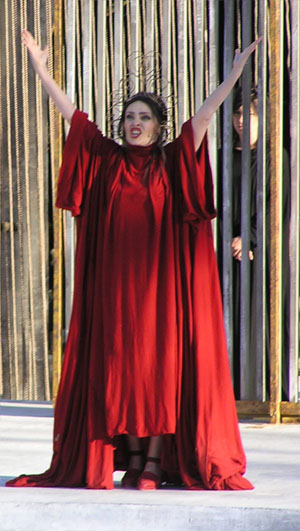Aeschylus' Agamemnon
 Themes, plot and chorus
Themes, plot and chorus
- On this page: discussion of the themes and plot
- Next Page : discussion of Agamemnon's guilt. Was he responsible for what he did and what was done to him? Does he have free will?
- Study the first Chorus in detail - essential to understand the religious innovations in the play.
- The House of Atreus. Agamemnon's family and background to the myth.
Aeschylus' Oresteia trilogy (Agamemnon, Libation Bearers, Eumenides) is Total Theatre using every resource open to the producer - language, metaphor, symbolism, verse, music, dance, gesture, costume, grouping, movement, scenery, visual effects, lighting.
Theme
![[The golden mask of Agamemnon]](agamemnon.gif) Human action in its most violent and problematic aspects - lust for power
and the violence that accompanies it; clash between male and female dominance;
crime and punishment; emotion v. reason; tribalism v. democracy; pollution
and purification. All are intensified because they occur within the family
(oikos), ONE oikos ...
Human action in its most violent and problematic aspects - lust for power
and the violence that accompanies it; clash between male and female dominance;
crime and punishment; emotion v. reason; tribalism v. democracy; pollution
and purification. All are intensified because they occur within the family
(oikos), ONE oikos ...
The Agamemnon
What to look out for as you read:
 Watchman
Watchman
The theatrical effect of darkness becoming light, but perversion of the normal
symbolism where light = joy (cf Antigone).
Hints of trouble - the woman who thinks like a man. A warning that what
is said isn't always what is meant.
Chorus 1
Origins of the Trojan War. Agamemnon and Menelaus = eagles robbed of their
young, whom the gods avenge. Zeus is protector of sacred guest-host relationship (xenia). Paris's crime is to offend against xenia (not the
rape of Helen in itself). Greek departure - eagles devour pregnant hare
(i.e. Agamemnon and his men will brutally destroy innocent lives in Troy).
Artemis therefore will try to stop the expedition. Decision is Agamemnon's
- to fight or not to fight. If he wants to fight, he must sacrifice his
daughter Iphigeneia. He is not compelled to do so, but "slipped his neck
in the strap of fate." Why? The chorus disapprove of his decision, and describe
the sacrifice in sickening detail, as a murder repugnant to any normal human
being. Agamemnon's feelings are perverted from the norm, as are those of
all the characters in the trilogy (esp Atreus, Thyestes, Clytemnestra, Orestes).
The sacrifice is not only morally wrong, but futile: the sacrificer becomes
the victim. Agamemnon is killed by Clytemnestra who is killed by Orestes. A more detailed analysis of the First
Chorus is available here.
 Clytemnestra & Chorus
Clytemnestra & Chorus
The beacons - Clytemnestra's early-warning system (why does she need it?).
Evidence of her male-type planning ability. Note her sympathy for the victims
of Greeks in Troy ( victims as her daughter Iphigeneia was). Note the irony of her wishes - she wants A.gamemnon home, so that
she can kill him.
Chorus 2
Double meanings - Paris caused the destruction of his city - but much of
this could apply to Agamemnon as well. Zeus destroyed Paris and Troy: are
Agamemnon and Argos next?
The Herald
News of brutalities and inhuman behaviour by Greek conquerors: gods have
punished the Greeks by shipwreck, but saved Agamemnon's ship. (Why?). Clytemnestra
changes to femininity to "welcome" her husband: note ambiguities of her
speech "just as the day he left her" / "dyeing bronze". Again we are reminded
not to be satisfied with appearances.
Chorus 3
No 'conquering hero' songs - sinister implications of Helen's name (Greek
root hel- means 'destroy'). Helenan - helenaus - helandros -
heleptolis. Lion-cub: Chorus mean Paris, but we can see it is Agamemnon
(or Aegisthus, or even Orestes?). 'Violence longs to breed' - reminds us
of the doctrine of Chorus 1 - 'we suffer and we learn' (pathos-mathos)
(p.111 - all page references are to Fagles' translation); 'from the gods
there comes a violent love' (p109).
Agamemnon's entry
No flattery from chorus, who warn him of danger. Agamemnon's speech - 'dull
and sententious' - confirms our fears about the treatment of Troy. Clytemnestra's
crawling reply. 'Crimson tapestry' scene: note brilliant theatrical effect
of 'river of blood' apparently flowing out of the palace (from Thyestes'
children, Iphigeneia - soon to be joined by his own, Cassandra's and then
Aegisthus' and Clytemnestra's). Agamemnon reveals his weakness, but she
isn't persuading him to do anything he doesn't want to do. (Just as when
he was persuaded to sacrifice Iphigeneia). Clytemnestra emerges as dominant
(as if 'male' over 'female' Agamemnon!). Persuasion daughter of Ruin (in
Greek Peitho daughter of Ate). But will Clytemnestra escape
the sea (of blood) herself?
Chorus 4
Fear, foreboding, hopelessness, confusion
 Cassandra
Cassandra
Silent - until Clytemnestra gives up trying to communicate. Why? She is
to be a sheep for sacrifice (like Agamemnon). But she can speak Greek:
she is the prophetess who sees the past, present and future as one. Chorus
can't understand. Themes - her own suffering at Apollo's hand; Thyestes'
feast; Thyestes' adultery with Atreus' wife, Aerope; Aegisthus' adultery
with Clytemnestra. She also sees Agamemnon's murder - worst crime of all
is to kill the kyrios (like Oedipus) - but chorus just can't grasp
that a woman can kill a king. Our sympathy begins to turn
away from Clytemnestra towards Agamemnon: note Cassandra doesn't mention
Iphigeneia. Clytemnestra's deed is a total inversion of all natural relationships:
is her true motive for murder not that he killed Iphigeneia, not that she
loves Aegisthus, not that she is jealous of Cassandra, but that she is jealous
of Agamemnon and his status as a man? (lines 1384ff)
The murder
Note the almost comic helplessness of the chorus - this is so unnatural
it can't be happening! Dramatic effect of having them speak as individuals
(only time).
Clytemnestra's triumph
Note the 'brilliant, if sickening metaphor' (spring rains).
Final scenes
Horror of the chorus, and their failure to believe a woman capable of what
she has done - undermining any remaining sympathy for her and Aegisthus.
Wife killing kyrios is worse than Agamemnon's killing of
Iphigeneia. Clytemnestra, who has controlled all the action up to now ('like
a brilliant producer or stage-manager') now naïvely thinks they can
all live happily ever after. But she is polluted, say the chorus (1426ff)
- and for the first time in the play they know more than she does.
Continue to next page? Discussion of Agamemnon's guilt. Was he responsible for what he did and what was done to him?

